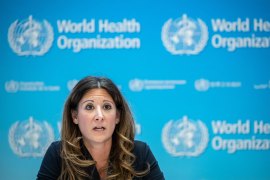‘Cycling’ HIV Drug Therapy Appears to Do ‘Little or No Damage,’ NIAID Study Says
HIV-positive patients who "cycle" their antiretroviral drug therapy at weekly intervals do "little or no damage" to their health, according to a new study from the National Institute of Allergy and Infectious Diseases presented yesterday at the 8th Conference on Retroviruses and Opportunistic Infections in Chicago, the Washington Post reports. The study of 10 patients is "far from definitive," but if the findings are verified by further studies, patients may be able to "cut in half" the amount of time they have to undergo the sometimes toxic drug treatment. In the study, patients received therapy for seven days, then went off the drugs for seven days, during which time the virus remained "fully suppressed." However, when two patients failed to resume therapy after seven days, HIV became detectable in their bloodstreams "soon after." Several of the patients continued the therapy for 10 months and showed "no evidence of damage to their immune systems or the development of resistant strains of the virus," as was feared. Researchers do not yet know if cycling will lead to drug resistance or reduce the side effects of the antiretroviral medications. Dr. Anthony Fauci, head of NIAID, said more study is needed and cautioned patients against cycling their medications without the advice of their doctor. "We don't want people to do this on their own," he added. Fauci and his colleagues originally hoped that patients could be "weaned off antiretroviral drugs for prolonged periods," but altered their course of treatment to the weekly cycles after a study of 24 patients on a two-months-on, one-month-off schedule showed that the virus "rebounded vigorously" in the off-month. Researchers had hoped that with each off-cycle, the body would be able to "control the virus longer, or push it lower, without the help of pharmaceuticals," but this was not the case (Brown, Washington Post, 2/8).
'Treatment Interruption' Shows Promise
Several studies reported Tuesday at the conference showed that "treatment interruption" therapies can work in some patients, and noted that the "best outcomes" were seen in patients who were treated soon after becoming infected, the Wall Street Journal reports. The interruption therapies sought to "stimulate" the immune system, instead of merely "hammering" the virus. Dr. Bruce Walker, a researcher at Harvard Medical School, hypothesized, "If patients could be treated very early, then maybe the immune system, sheltered from the onslaught of the virus, might be able to develop a strong counterattack and gain the upper hand." After stopping therapy that had suppressed viral load for at least eight months, four of 14 patients in Walker's study were able to "keep their virus in check" (Schoofs, Wall Street Journal, 2/7). However, patients whose viral load reached 50,000 copies per milliliter of plasma or remained greater than 5000 copies/ml for three consecutive weeks restarted therapy (Walker, "State-of-the-Art Lecture and Summary," retroconference.org, 2/6). After additional on-off cycles, three more patients were able to control their HIV, bringing the success rate to 50%. Walker also found that after a second cessation of therapy, patients were able to control their virus "much longer" than they had after the first cycle: for six months on average compared to one month after the initial therapy cycle. Walker said that just how long the immune system can control the virus without drugs remains an "unanswered question." He added that "given all the uncertainty ... there is no role for this in clinical practice at this time." A study conducted by Dr. Martin Markowitz of the Aaron Diamond AIDS Research Center in New York of 15 newly infected patients who had stopped taking their medications on their own showed that only three patients were able to keep the virus at "low levels." Two of those patients also had a genetic trait "known to help people naturally resist HIV" (Wall Street Journal, 2/7).






